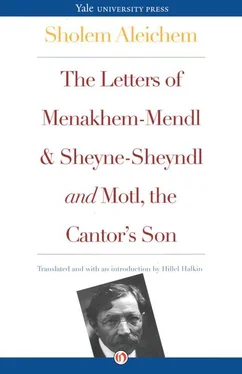“Easy there! Where are your manners?”
Before long Elye’s book was a heap of ashes. Only one page was not completely burned. You could still make out the word “Shemeritsi” on it.
You may remember my wanting you to meet Pinye. I said he was a quick thinker. Before I introduce him, though, I’d better tell you about his grandfather, his father, and his uncle. Don’t worry, I’ll make it short. I’ll start with his grandfather.
You’ve never heard of Reb Hesye the glazier? That’s Pinye’s grandfather. He’s a glazier, mirror maker, painter, and tobacconist all in one. Nowadays he makes and sells snuff. As long as you’re alive and kicking, he says, you should work and be independent. He’s a tall, thin fellow with red eyes and a monster nose, broad below and curved like a shofar on top. I’ll bet it got that way from taking snuff. He’s still pretty sharp, even though he’s a hundred years old. Some say he has more brains than both his sons put together. That’s Hirsh-Leyb the mechanic and Shneyur the watchmaker.
Hirsh-Leyb the mechanic is Pinye’s father. He’s tall and thin like Reb Hesye with the same monster nose, even though he doesn’t take snuff. He’s an oven mechanic. That means he makes ovens. They all say he has a good head on his shoulders. It sure is a big one with an enormous forehead. Hirsh-Leyb, they say, could learn any trade and be tops at it. There’s nothing he can’t figure out. He even says so himself. One look at anything is all he needs.
Hirsh-Leyb taught himself to make ovens. He did it by watching Ivan Pichkor the oven maker and almost dying of laughter. The poor goy, he said, didn’t know the first thing about ovens. Hirsh-Leyb went home, took apart his old oven, and built a new one from the same bricks. It smoked so badly that he nearly choked, so he took it apart and made another. A couple of tries later he was a famous mechanic.
Hirsh-Leyb has invented an oven that holds its heat for eight whole days. If he had the materials, he says, he could build it. Just give him the right sort of tiles and he’ll make an oven you’d pay to see. An oven, he says, takes more brains than a watch. That’s a dig at his brother Shneyur.
Hirsh-Leyb’s brother is younger and even taller and has the same nose. He’s a watchmaker. With a mind like his, they say, he could have been a rabbi or a teacher or a slaughterer. That’s how good a student he was. But he wanted to be a watchmaker. Why a watchmaker? It’s like this.
To listen to Shneyur, he was always figuring things out, even as a boy. For example, he thought a lot about locks. Why did one lock open with three twists to the right and another with three twists to the left? What made a clock tick? How come it chimed when the hour hand reached twelve?
The first time Shneyur saw a cuckoo clock, he nearly went out of his mind. It had been given to his father by a retired colonel in payment for some work. Every hour a door opened and out came a bird and said, “Cuckkoo!” It looked real enough to be alive. Even the cat was fooled. It went for that bird every time it appeared.
Shneyur swore he would find out how that clocked worked. One day when no one was home he took it down from the wall, unscrewed all its screws, and emptied out its insides. His father beat him so hard that he was given up for dead. To this day, he says, you can see the marks. That didn’t stop him from becoming a watchmaker, though. I don’t know if he’s the best there is, but he’s cheap and he’s fast.
Shneyur has repaired my brother’s watch many times. He fixes it at least once a week. Elye has a funny watch. When it isn’t running faster than a madman, it’s four hours slow or has stopped completely. Go get it to start again! Elye would look for another watchmaker if he wasn’t afraid of hurting Pinye’s feelings. Pinye says it’s the watch’s fault, not his Uncle Shneyur’s. It’s simple logic, he says. If the watch were a normal watch, any watchmaker could fix it. Since it isn’t, what difference does the watchmaker make?
You can’t argue with that.
Pinye has a head like his father’s and his uncle’s. He has their nose too. His whole family is nosey. His Aunt Kreine’s daughter Malka has a nose that’s beyond belief. Actually, it’s more the face that her nose is on. It isn’t quite human. It looks more like a bird’s or an animal’s. She’s ashamed to go into the street with it. Lord-a-mercy!
Although Pinye looks like Malka, he’s a man. It doesn’t matter so much what a man looks like. Still, you can’t help laughing at the sight of him. Besides being tall and thin with a pair of long ears and a neck like a gander’s, he’s nearsighted. He’s always bumping into you. Watch out for your feet when he gets up to leave a room. One pants leg is hiked up, one sock is falling down, his shirt is rumpled, and his tie is never where it should be. He talks with a wheeze and sucks on candies. He always has something in his mouth.
Pinye is quite a fellow. There’s nothing in the world he doesn’t know. Folks say he knows more than the rabbi. He can put the biggest genius in his little pocket, Pinye can. You should see his handwriting too! And he’s a whiz at rhymes. Pinye can rhyme anything. He’s rhymed our whole town — the rabbi, the slaughterer, the beadles, the butchers, his own family, everyone.
Pinye’s rhymes can make you die laughing. They’re passed around and learned by heart. I even remember a few myself. Here’s one:
Shmuel-Abba the beadle
Is certain to eat all
He can when he sits down to dinner.
He grabs what he’s able
To take from the table
And doesn’t get up any thinner.
And Nechameh his wife?
As I value my life,
I’d rather we didn’t discuss her.
Her brain’s smaller than that
Of the rabbi’s old cat—
The devil take her and cuss her!
The whole town buzzed with this poem. One man even set it to music and sang it at his Sabbath meal. The song went round until it got back to the beadle and his wife. They sent for Hirsh-Leyb the mechanic and asked with tears in their eyes what Pinye had against them. Hirsh-Leyb went home, locked and bolted the door, and gave Pinye a licking. He whipped him so hard that Pinye gave his word of honor never to write another rhyme in his life.
Pinye hasn’t rhymed a word since. He says the rhymes don’t come any more. That’s because he has problems. It all started with his wanting to get married. I mean it wasn’t Pinye; it was his father, who wanted to make a man of him. He arranged a match with the daughter of a miller and the miller set Pinye up in the flour business.
Elye envies Pinye for having his own business. Pinye just laughs. It may be a business, he says, but it’s no business of his. What kind of work is messing around with flour? At most it’s a job for some young moron of a miller’s son. He’s not to blame, Pinye says, if he can’t sit still in a store. His mind keeps flying off. His whole family is like that. They’re high flyers.
That’s what Pinye says. He doesn’t want to run a store. He’d rather enjoy a good book. That makes his father-in-law the miller sore. There’s nothing the man can do about it, though, because he’s afraid of ending up in Pinye’s rhymes. And his daughter is delicate, an only child. Taybl, her name is. She has a face like a Cossack’s but she’s as good as gold. My mother says she hasn’t a drop of gall. It beats me how anyone can count the drops. Taybl minds the store while Pinye stays at home. Elye and I drop in on him there. He tells us everything. Pinye likes to gripe about his fate. He’s boxed in, he says. He can’t breathe. If only he could get away, he would be a different man. A year to see the world is all he asks. So he says to Elye. Elye is the one person he trusts. He shows Elye letters from important people. The important people write Pinye that he has it in him. Pinye thinks he has it in him too. I look at him and think: God almighty, just what does he have there?
Читать дальше












